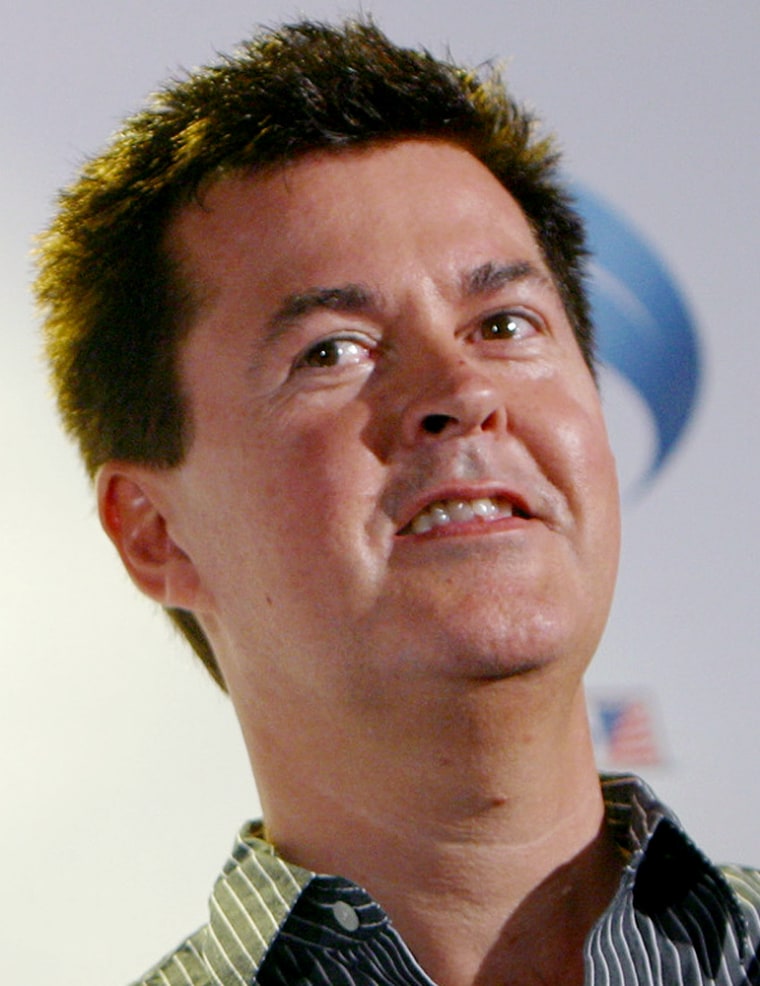Fox's annual populist extravaganza, "American Idol," currently in its sixth season, is arguably the most lucrative show on the air, boasting some of the highest advertising and product placement rates on television. (Those beverages the Idol hosts sip all night might be the most expensive Cokes in history.) Fox purportedly pays snarky judge Simon Cowell at least $30 million a year for his presence on the show, which doubtless works out to something like $10,000 per barb.
But the wealth does not trickle down to contestants of the top-rated talent show. In exchange for competing, contestants give show creator Simon Fuller, and his British production outfit, 19 Entertainment, first dibs on signing them to recording contracts, which though famously secretive are widely regarded as the stingiest in the music industry.
Fuller also gets a cut of every CD, endorsement, TV, movie or T-shirt bearing the likeness of his Idol charges. (Fuller’s 19 Entertainment was bought out in 2005 by CKX Inc. for $174 million in cash and stock.) While managers traditionally enjoy a 15 percent or so cut of a performer's contract, 19 Entertainment reportedly takes as much as 50 percent. ("My deals are the best in the world," Fuller protested to the Associated Press in 2003.)
The American Idols Live Tour, which rounded out its fifth year last summer, grosses an average $400,000 per show — that’s $80 million over five years.
Like all the other contracts associated with Idol, how much the performers are paid for these gigs is top secret. It’s likely not much. Some critics speculate it's on the order of $5,000 a night. (Performers reportedly face $5 million fines for any leaks to the media about their compensation.) But it's especially telling that the first season's winner Kelly Clarkson severed ties with 19 shortly after the release of her 2004 triple platinum album Breakaway. She then refused permission to American Idol for contestants to sing her songs on the show.
Indeed, American Idol may offer a shot at fame, but maintaining it and parlaying it into a lasting lucrative career is another matter entirely. Clarkson has sold some 8.3 million albums in the U.S. and boasts endorsement deals with Ford Motor, Proactiv, Vitamin Water and Candie's. With Some Hearts, fourth season champ Carrie Underwood scored the biggest debut of any country artist since SoundScan launched its tracking system in 1990. She is also a pitchman for Hershey and Skechers. Idol winners Ruben Studdard and Fantasia Barrino have done well, but not astonishingly so, both selling just over 2 million albums apiece. Neither has any major endorsement deals and no major concert tours.
No wonder New York native Mario Vazquez, a favorite of season four, bailed out after becoming a finalist. A year later — once his existing contract with American Idol lapsed--Vasquez resurfaced with an Arista record deal and a hit single, "Gallery." Though he cited personal reasons for quitting Idol, the unprecedented move immediately sparked talk that Vazquez thought he'd do better as a free agent. Vazquez's lawyer, by the way, is also Clay Aiken's and helped the season two runner-up sever his contract with 19 Entertainment.
Idol reject Jennifer Hudson, who finished sixth on season three, left little to no impression on audiences. Cowell told her that she was "out of [her] depth in this competition." She seemed to have faded into post-Idol oblivion. Then Hudson landed a role in the Dreamworks SKG musical Dreamgirls, intended as a star vehicle for Beyonce. But Hudson stole the show and is generating Oscar buzz for her role as Effie White. Hudson recently signed a reportedly "generous" record contract with J Records and is fielding various endorsement offers.
American Idol has also goosed careers of those who have never even competed on the show. Crooner Daniel Powter shot to fame when his song "Bad Day" became the soundtrack for the farewell montage played for a parting contestant each week. He subsequently sold two million copies of the track, and "Bad Day" became the biggest-selling downloaded song since Nielsen SoundScan began tracking digital downloads in 2003. Other artists whose songs have been featured on the show, like KT Tunstall, Gavin DeGraw and Keith Urban, have also seen a boost in sales.
Even special guests enjoy a surge in profits after making an appearance. Barry Manilow coached the contestants in one season five episode. Soon after, his Greatest Songs of the Fifties album jumped 20 spots to No. 4 on the pop charts.
